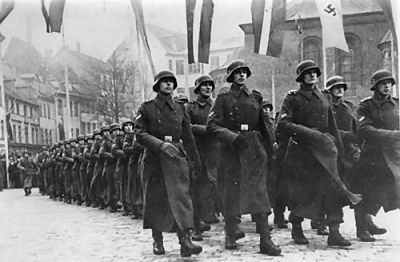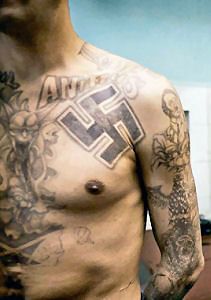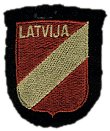A different kind of Holocaust remembrance
Originally posted at jns.org on 21 March 20131
By Alina Dain Sharon/JNS.org
"Legion Day" isn't the type of Holocaust remembrance ceremony that the Jewish community is used to.
Every year on March 16, Latvia hosts a ceremony and march in the country's capital, Riga, to 1commemorate Latvian veterans who fought in the Nazi Waffen-SS in a failed 1944 battle against the Soviet Red Army.
 Latvia's "Legion Day" commemorating the Nazi Waffen-SS, in 2008.
Latvia's "Legion Day" commemorating the Nazi Waffen-SS, in 2008.Credit: Dezidor/Wikimedia Commons.
Latvian Legionnaires (Waffen-SS veterans) and other Latvian nationalist groups maintain that they have the right to recognize the 1944 battle, but international and Jewish groups have criticized the annual "Legion Day" for honoring the Nazi army. During the Holocaust, the Nazis murdered about 70,000 Jews in Latvia, according to Israel's Yad Vashem Holocaust museum. 2Twenty-five thousand Jews alone were executed in the Rumbula Forest near Riga in 1941 while the Nazis liquidated the Riga ghetto.
3Former New York State Assemblyman Richard Brodsky, who just returned from leading a U.S. delegation to Latvia to protest this year's march, shared his impressions on the march with JNS.org as well as his thoughts on emerging ultra-nationalist movements in Europe—not only those in Latvia, but also the neo-Nazi Golden Dawn party in Greece, among others.
JNS.org: As a U.S. lawmaker, how and why did you become involved in the issue of European ultra-nationalism?
Richard Brodsky: "I've been active in this kind of thing for over 30 years. 4I helped arrange delegation of diverse U.S. public officials to protest President Ronald Reagan's visit to the Kolmeshohe Cemetery in Bitburg, Germany, the burial site of many Waffen-SS soldiers. German President Helmut Kohl asked President Reagan to visit these graves, and it was such an outrage that we flew over and stood in silent protest.
"Frankly this issue is often not taken seriously in America. We picture Nazis as bumbling fools, like in Hogan's Heroes, or fringe crazy people like George Lincoln Rockwell. That's dangerous. 5I'm part of a group, World Without Nazism, that has members from all over the world and monitors Nazi incidents and organizations all over the world. We'll probably go to Washington D.C. this summer to extend the discussion."
Why did you travel to Latvia to attend the Waffen-SS rally March 16?
"At least 50,000 Jews, Gypsies, mentally ill and political prisoners were murdered, mostly shot, during the war. 6Members of the Latvian Legion of the Waffen-SS swore personal loyalty to Hitler and had members who were part of death squads. We focused on the Waffen-SS march in Riga because it was so clearly unacceptable. It was originally an official event but was removed from that status in 2001 after an international outcry. Last week the Latvian Parliament, the Saemia [sic.], rejected an attempt to reinstate it. 7We wanted to thank the Latvian Parliament but also witness for ourselves the resurgence of old and new Nazi efforts. If you speak to Americans, many simply don't understand that there are genuine, resurgent Nazi movements around the world. Going to see it has been part of an effort to make sure the American public takes it seriously."
What struck you the most at the rally?
"The large numbers of people 8honoring the Waffen-SS, including many, many young people, the surviving members of the Waffen-SS wearing their original uniforms, the anger and violence in their faces, the aggressive actions of Members of the Latvian Parliament from political parties that raise up the Waffen-SS, the ability to buy Nazi memorabilia in stores, there are many lasting images. At the same time, we acknowledged that the Seimia had refused to make the march a national holiday, and there are many, many Latvians appalled by the re-emergence of Nazi sympathizers. But the reasonable conclusion from the march is that it is not some weird, bizarre fringe thing; it's happening all over the word and no one is paying attention."
 The Latvian Waffen-SS Legion marching on Latvian Independence
The Latvian Waffen-SS Legion marching on Latvian IndependenceDay, 1943. Credit: German Federal Archives.
Many Latvians who defend this annual event say that because the Latvian Waffen-SS unit was formed in 1943, several years after the Rumbula Massacre, they cannot be blamed. How do you respond to this argument?
"There is a reasonable historical argument about the Latvian Legion. 9Some were motivated by a desire to oppose Soviet troops; 10some volunteered; 11some were drafted; 12some did nothing wrong that we know of; 13some were murderers; 14all swore a personal oath of loyalty to Hitler. 15The killings of the Jews went on for a long time, some members of the Latvian SS had been members of death squads. 16But it does not matter to me whether the people I saw helped kill one person or 50,000. One is enough. 17More importantly, this historical argument has nothing to do with holding a public ceremony to honor the Waffen-SS. 18Every society has its fringes and we understand that, but these movements are moving to the mainstream. That's why World Without Nazism has a role to play."
Why should Americans, and the American Jewish community especially, be concerned with this issue?
"If 'never again' means something, it means vigilance and truth telling. 19These movements are real and growing, and it's time that the American government addressed this phenomenon. Now is the time for the US to begin to acknowledge these movements, and then to be heard in a responsible but vigilant manner about them. It would be a mistake to make too much of what's happening, but it would be a bigger mistake to pretend it's not happening."
The original report includes videos provided by Brodsky, one captioned "Surviving members of the Waffen-SS in uniform with supporters honouring the Latvian Legion on March 16, 2013." and another captioned "Richard Brodsky confronts a man who had complained about the unfair singling out of Latvia during the rally honouring the Latvian Waffen-SS Legion on March 16, 2013. Then a surviving member of the Waffen-SS appears in his original uniform and in response to the ruckus says, '20there go the kikes again.'"
Examination
Terminology: "Latvian Waffen-SS" and "Latvian Legion" are interchangeable below. No Latvian was a member of the Nazi party or a member of Hitler's elite German SS. Therefore there is no "Latvian SS", "Latvian Nazi SS" or "Latvian Nazi Waffen-SS".
Latvia was occupied, and the only option for a rifle to keep the Soviets from returning was a German one. Whether volunteered or conscripted, whatever oath Latvians said to get that rifle conveys no loyalty to Hitler, to Nazi Germany, or the Nazi ideology. And the notion that an oath a forcibly conscripted individuals — the vast majority of Legionnaires — is compelled to recite has any significance is, frankly, laughable.
First, the Nazi Waffen-SS oath, a true swearing of loyalty to Hitler:
I vow to you, Adolf Hitler, as Führer and chancellor of the German Reich, loyalty and bravery. I vow to you and to the leaders that you set for me, absolute allegiance until death. So help me God.
Perhaps Brodsky was unaware that oath caused such outrage among the Latvians that it was changed to:
In the name of God I solemnly swear, in the fight against Bolshevism, to unconditionally follow the orders of the head of the German military force, Adolf Hitler, and as a brave soldier to be always prepared to lay down my life in execution of this oath.
That is, Latvians would obey the German chain of command in combat on the Eastern Front. Meanwhile, Latvians wore the Latvian flag under their uniforms as their true loyalty oath.
Regarding death squads such as Arajs Kommando, which had not been part of the Latvian Legion during the Holocaust in Latvia because the Latvian Legion did not yet exist, the Nazis deployed these on the front as conditions deteriorated. Brodsky invokes that deployment to tar the entire Latvian Legion.
The next section deconstructs Brodsky's "reasonable historical argument" regarding the Latvian Legion:
Behind the headline
Brodsky's concluding statement in praise of World Without Nazism poses the greatest danger:
18“Every society has its fringes and we understand that, but these movements are moving to the mainstream. That's why World Without Nazism has a role to play.”
 Russian prisoner with Nazi swastika,
Russian prisoner with Nazi swastika,Credit: Yuri Kozyrev NOOR
World Without Nazism has co-opted the moral cause of battling neo-Nazism for the Kremlin's propaganda purposes. Brodsky legtimizes it, an organization whose actual purpose is to paint Russia's detractors as fascists.
This brings us to the last video posted with the article:
20“there go the kikes again”
What the (surely) 90+ year old veteran said as he passed by the demonstrators—ranks of Russians and Jews shouting at him calling him a Nazi and murderer—was "Tādi jau ir žīdi...", "Well, that's what Jews are like...", meaning, here they go again calling him a Nazi and a murderer.
What he did not say is "There go the kikes again".
There is no such word in Latvian for Jews. Rather, it was Brodsky's World Without Nazism hosts who translated "žīdi" as "kikes."
"Žīdi" is the proper Latvian noun for Jews and in no way a slur, found in Latvian sources from ancient folk songs to the entry for the letter "Ž" in children's alphabet books. Regarding the contemporary use of "ebreji" (Hebrews) in Latvia, that is a manufacture of the Soviet era. One of the first edicts of the occupational Soviet state was to rename everything "Jewish" as "Hebrew," to shift the heart of Jewish community and culture from the traditional Yiddish-speaking "žīdi" to the Russian-speaking "ebreji." The contention that "ebreji" connotes respect and that "žīdi" means "kikes" is unfounded in Latvian cultural and societal history.
Brodsky believes he's a member of an anti-Nazism organization. No, he has been recruited into a Kremlin agitprop campaign — unaware of what, and whose, agenda he serves.
| 1 | Article published at jns.org, retrieved 16-Oct-2014 |
| 2 | Тезисы выступления Министра иностранных дел России С.В.Лаврова на встрече с представителями российских неправительственных организаций международной специализации, Москва, 23 марта 2011 года — Summary of Remarks by Russian Foreign Minister Sergey Lavrov At A Meeting With Representatives Of Russian Non-Governmental Organizations of International Specialization, Moscow, March 23, 2011, The Ministry of Foreign Affairs of the Russian Federation web site, retrieved 16-Oct-2014 |
